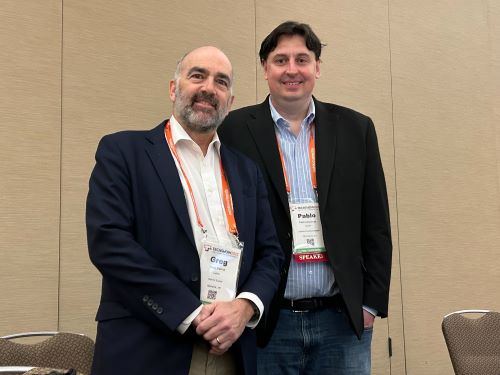How can lawyers use AI to improve their practice?

Greg Siskind is co-founder of Siskind Susser, and Pablo Arredondo is co-founder and chief innovation officer at Casetext. Photo by Amanda Robert.
As cool as it is that artificial intelligence can generate text, that’s not what will matter most to the practice of law in the coming months and years, said Pablo Arredondo, co-founder and chief innovation officer at Casetext, a legal technology company that aims to improve access to legal research.
“It can read text and summarize it and annotate it and translate it, and it can categorize text and synthesize it and interpret it,” said Arredondo, a 2017 ABA Journal Legal Rebel, who spoke on a Friday panel at the ABA Techshow 2023 titled “Empower With AI: How AI Could (and Perhaps Already Is) Changing Your Practice.” “These are the things that lawyers spend a lot of their time doing in various ways, and having AI that can assist you while you do that is critical.”
Casetext recently released CoCounsel, which it describes as the first AI legal assistant. The program utilizes the latest and most advanced models from OpenAI and differs from the commercially available ChatGPT because it was trained on Casetext’s legal information database.
Arredondo said because other language models have been known to offer false information, his company wanted to create a tool that can more reliably help lawyers with legal research, contracts and other tasks.
In addressing the risks and the benefits of AI tools, Arredondo said it remains important to “trust but verify” when using any language model. Lawyers should understand the technology and use it responsibly.
He also contended that AI is not a “robot lawyer,” and it doesn’t replace lawyers. It will open the door to more conversations for how it can be used in the practice of law, such as what does it mean for client consent or associate training?
“It doesn’t actually change anything about the lawyer’s ultimate responsibility or the work that they do for a client,” he said. “If it is used correctly, it can add a huge amount of value. … This is a tool to help lawyers do what they do every day.”
Greg Siskind, co-founder of Siskind Susser, a national immigration law firm based in Memphis, Tennessee, also spoke on the panel and shared with the audience how he has used AI in recent years.
“There are lower tech, low-code or no-code platforms available to build automation tools,” Siskind said. “When we’re talking about AI for lawyers, we’re basically talking about automating tasks in your practice.”
Siskind’s firm uses Afterpattern, a no-code platform that was acquired by cloud-based document and email management service NetDocuments in November 2021. It allows firms, legal aid organizations and courts to create document and workflow automations.
But there are several other options, Siskind said, including Gavel (formerly Documate) and Josef, that are available to lawyers.
Follow along with the ABA Journal’s coverage of the ABA Techshow 2023 here.
Siskind has used the platform to build an app that screens Ukrainians for Temporary Protected Status eligibility. He has also used it as a drafting tool, which enables him to onboard hundreds of plaintiffs in mass immigration litigation in a short amount of time. Through the process, they answer basic questions to determine whether they qualify to be a plaintiff in a specific case, agree to and sign an engagement letter and then complete a declaration letter.
“The whole thing happens in a matter of minutes,” Siskind said. “Before, we put tons and tons of labor into getting that information and drafting the declarations. Now, we can start onboarding for a case and file it two weeks later.”
Siskind added that he has used Afterpattern for form I-9 digitization and auditing and for generating retainers. In the past few months, he also began to use Casetext’s CoCounsel to conduct research for his mass immigration litigation.
“Everything that I hate about ChatGPT is like, ‘It’s nice it said that, but what is that based on?’” Siskind said. “But this tool basically produced a 20-page memo that had all the cases that discussed a particular issue, links to those cases and summaries under each citation telling us what that particular case was about. It was wonderful for the amount of time it saved.”
See also:
ABAJournal.com: “The Case for ChatGPT: Why lawyers should embrace AI”
ABAJournal.com: “ABA House adopts 3 guidelines to improve use of artificial intelligence”
ABAJournal.com: “Should lawyers embrace or fear ChatGPT?”



